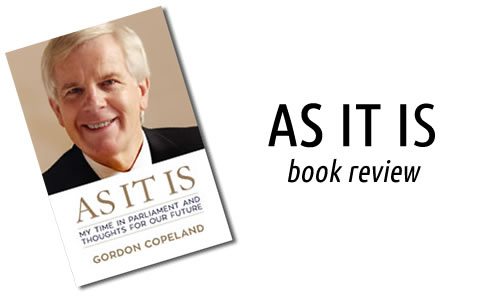‘AS IT IS – My time in Parliament and Thoughts for our Future’
Drawing on his life experience and time as an MP Gordon Copeland, sets out a passionate vision for New Zealand’s future. In doing so he addresses a wide range of issues from fundamental social reform, the road to economic success for all rather than the few, a pathway to happiness in family life and even international affairs. All of these issues are dealt with in detail underpinned by the values of justice, peace, compassion and inclusiveness for all. This book is anything but “politics as usual”!
A review by former Cardinal Tom Williams can be found at the bottom of this post.
About the author
Gordon Copeland was a Member of Parliament for two terms between 2002 and 2008 and has maintained an active interest in politics for much of his life, an interest which has continued beyond his time in Parliament.
With qualifications in accounting and economics Gordon has had a varied career including senior executive positions in the NZ and International Oil Industry, Business Consultancy for Corporate and Government clients, financial administration for the Archdiocese of Wellington and, following his time in Parliament, Investment Management.
He has been married to Anne for more than 50 years, has five children, ten grandchildren and three great grandchildren.
He lives in Miramar, Wellington and his interests include church, sport – especially rugby – gardening and politics.
You can order the book through any bookstore by quoting the ISBN number, 0473334089, RRP $35.
However, the author is kindly offering NZCN readers special price of $28 per copy (including postage and handling in NZ only). Simply email gordon.copeland@xtra.co.nz with your delivery address and he will send you a copy along with your invoice.
Chapter Headings
- How it all began
- The Election Campaign 2002
- Early days in Parliament
- The Prostitution Reform Bill
- The Euthanasia Bill
- Working with Michael Cullen 2002-2005
- Other Tax Matters
- The Foreshore and Seabed
- My Member’s Bills
- Relationships and Civil Unions
- Abortion and Related issues
- The 2005 Elections and its Aftermath
- Marriage (Gender Clarification) Amendment Bill and Same-sex Marriage
- Easter Sunday Trading
- The Parliamentary Prayer
- The Partial Sale of State Owned Enterprises
- I resign from United Future
- Judeo-Christian Values
- The Rise and Fall of the Kiwi Party
- The Anti-Smacking Bill and Referendum
- Housing Affordability
- The Working Women’s Charter
- Family Matters
- Foreign Affairs and Trade
- In all things Unity; the Maori Question.
- Does Labour have a Future?
- Epilogue
Review by Cardinal Thomas S. Williams ONZ
With Gordon Copeland’s withdrawal in 2007 the United Future Party lost a capable and creative MP. Gordon knew his resignation would likely bring his political career to an end since his chances of being elected for a third term in a new party were slight. But conscience dictated that he sacrifice a calling which he enjoyed and for which his more than six years in the House proved him well qualified.
Conscience is hardly prominent in most books by ex-parliamentarians. Their contents deal more with political strategies justified by their appeal to the voter. Moral issues are generally passed over, and conscience is rarely invoked. “As It Is” is markedly different. For Copeland conscience is paramount. The validity of arguments for or against any Bill he tested, not against the likelihood of gaining or losing electoral votes, but in the light of the common good of the nation and its people as determined by adherence to enduring principles and moral standards.
“As It Is” sets out with admirable clarity the legislative changes enacted during the 2002-2008 period. It treats such matters as taxation, the sale of State-owned enterprises, and the Foreshore and Seabed Bill. Given Copeland’s expertise in the areas of finance and commerce, his interventions in Select Committee hearings and debates in the House were cogent and compelling, even if disregarded for party political reasons.
That his stands and those of his fellow United Future MPs on social issues were not popular with some are not surprising, since traditional beliefs and values have been systematically subverted by the derision and hostility towards the whole Judeo-Christian ethic upon which civilisation has been based for the pass two Millennia. Relativism and permissiveness have been deliberately prompted, and morality reduced to purely subjective preference.
Copeland’s account of the passing of the Prostitution Reform Bill show how meaningless “conscience votes” have become in Parliament. Enough MPs ceded conscience to party pressure to ensure that in New Zealand street-walking is now as respectable as shop-walking. So, too, the definition of marriage has been widened to include all manner of relationships that are anything but marital. For most political parties, crucial issues such as aborting the unborn and physician assisted suicide, speciously termed “the woman’s right to choose” and “death with dignity”, are determined by public polling.
The sad story of the near demise of the United Future Party is revealed in one chapter. It was born in 2002 of a merger between the United Party with Peter Dunne as its sole MP and Future New Zealand, at that time without an MP. The merged Party contested the 2002 Elections and gained eight seats. Dunne who held the only electorate seat, unilaterally changed the Party’s stances after the 2005 Election, and so eventually silenced what had been well-argued opposition to over-liberal social legislation.
Equally enlightening is the chapter devoted to the Kiwi Party and the machinations of Brian Tamaki of Destiny Church which put paid to the Party’s potential.
Much else of value can be learned from Gordon Copeland’s 164-page book, not only from the pages devoted to his six years in Parliament, but also from his reflections in the concluding chapters on housing, family, foreign affairs trade and other controvertible topics.
Although but two terms as an MP, the lessons Copeland learned and shares in “As It Is” are well worth heeding by all interested in parliamentary processes and party positions.










0 Comments